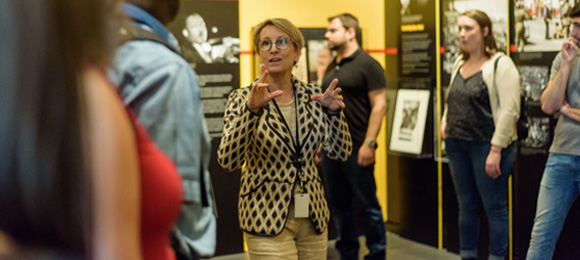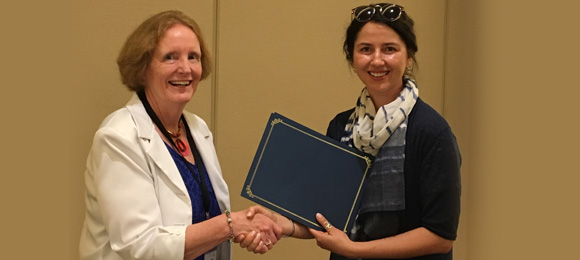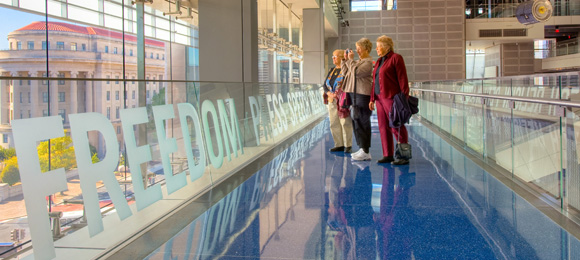August 2019 E-Newsletter
This month get our take on how to best address conspiracy theories in the classroom, plans for our open house celebration, a call for Student Advisory Team members and more!
Not on our mailing list? Subscribe.
Welcome Back to School. Celebrate Open House With Us Oct. 5!

Countering Conspiracy Theories With Critical Thinking
Conspiracy theories and their potentially violent impact have been a topic of national discussion in recent weeks. For the first time, the FBI has begun to identify fringe conspiracy theories as a domestic terrorist threat. A recent mass shooting in El Paso, Texas, is linked to a screed posted online that touched on several conspiracy theories, including claims that there was a “Hispanic invasion” and that corporations controlled the government. This document also praised the New Zealand mosque shooter, who said he was motivated by the “great replacement” conspiracy theory that warns of forces trying to replace white citizens with non-white immigrants.
Belief in conspiracy theories is not confined to just extremists, however. A study conducted by political scientists J. Eric Oliver and Thomas J. Wood from 2006 to 2011 surveyed Americans about seven common conspiracy theories, ranging from “Barack Obama was born outside the U.S” to “The U.S. government planned 9/11 to justify war in the Middle East” and “Aircraft vapor trails contain chemical agents being deliberately deployed into the atmosphere.” The research found that at least 50 percent of Americans consistently believed in at least one of the seven theories presented.
A Sampling of Press Coverage
- Conspiracy Theories Might Sound Crazy, But Here's Why Experts Say We Can No Longer Ignore Them, Time
- Exclusive: FBI warns conspiracy theories are a new domestic terrorism threat, Yahoo News
- Christchurch endures as extremist touchstone, as investigators probe suspected El Paso manifesto, The Washington Post
- Disrupting extremist conspiracy theories, University of Miami News
Our Take
As educators, the existence and ongoing spread of conspiracy theories pose a unique challenge. So how best to address this problem in the classroom?
We suggest that you begin by explaining to your students that conspiracy theories, even when ugly and hateful, are generally protected by the First Amendment in the world outside school. That is, unless they cross the line into an immediate incitement to crime or violence, constitute a true threat to an individual, or are fighting words that cause an immediate breach of the peace. Discussing current conspiracy theories in the news can be an opportunity to remind your class what limits do and do not exist on free speech, as defined by the courts at this time. NewseumED's “You Can’t Say That!?” class takes students through some of these exceptions with interactive, real-life case studies.
You can also teach your students how to act responsibly when they come across this type of content. Pausing to think critically before liking or sharing conspiracy-fueled posts or articles can go a long way to stopping the spread of damaging misinformation. According to a 2018 survey by Pew Research, 71 percent of U.S. adults trust the information they get from friends and family. All of us, therefore, have an important role to play in reducing the spread of conspiracy theories and need to be thoughtful about what information we choose to pass on.
Our Is This Story Share-Worthy? infographic and accompanying lesson plans encourage students to consider the nature of the content they encounter and the possible consequences of sharing. Students need to learn that not every story is worth endorsing with their text, tweet or share. Our E.S.C.A.P.E. Junk News infographic provides additional tips for determining the trustworthiness of a story, such as checking the information with that on other sites and evaluating the legitimacy of the source.
It’s hard to predict how technological advances will change the way conspiracy theories are spread and amplified in the future, or what new theories will emerge, but we can work to meet this challenge by exercising thoughtful, civic responsibility in the news and content we share.

NewseumED Resources and Connections
It’s an Open House You Won’t Want to Miss!
Plan to be part of our 10th and final fall Teacher Open House at our Pennsylvania Avenue location on Saturday, Oct. 5. Don’t miss this opportunity to celebrate our past and look forward to our future. Find out what’s ahead for NewseumED and the Freedom Forum Institute. Learn about our free digital classes and content, attend special programs, explore exhibits, take tours and indulge in fun activities with your peers. Free admission for educators and school and community librarians/media specialists. Register in advance for a chance to win door prizes.
Book a Virtual Class
Discover what more than a hundred educators already know – you don’t need to physically visit the Newseum to take a NewseumED class. Our offering of 11 virtual classes will continue after the museum building closes Dec. 31. So, whether you're across the world or right next door, our NewseumED teachers are ready to lead live, virtual classes with your students on media literacy and First Amendment topics. All classes are free of charge. Check out our list of classes and booking information here. A New Jersey teacher said she “couldn't be happier and more grateful” after her students took virtual classes on the importance of detecting fake news. “The materials … were highly engaging and informative. I will definitely... schedule another virtual.”
Wanted: Student Advisory Team Members
Please tell your students that we're looking for new members to join our Student Advisory Team for the 2019-20 school year. Members provide feedback on and contribute to the development of new curriculum, educational programs and our website. It’s a great opportunity for middle and high school students to share their opinions and be a part of a team that makes a difference! Applications due by Sept. 13. Go here for more information and an application.
Exhibit on Tet Offensive Now Online
Twenty-two powerful photographs of U.S. Marines engaged in fierce fighting at the Battle of Hue are now available for viewing on NewseumED.org. The work of Stars and Stripes photographer John Olson was featured in an exhibit at the Newseum in 2018 to mark the 50th anniversary of the Tet Offensive. The Marines and Tet: The Battle That Changed the Vietnam War includes interviews with Marines, who fought in one of the bloodiest battles of the war.
Can Your Students Name All 5 Freedoms?
Sadly, three in 10 Americans in a recent survey were unable to name a single freedom guaranteed by the First Amendment. (At least, it’s an improvement from the previous year.) The annual survey by the First Amendment Center of the Freedom Forum Institute captures the views and opinions of U.S. adults on the amendment and its contemporary issues. We've got the resources to help your students understand and name all five freedoms.

NewseumED in the Community
AEJMC Recognizes Our Work
Outreach coordinator Barbara Pearson accepted an award at the Association for Education in Journalism and Mass Communications conference Aug. 7 on behalf of the NewseumED team. We received an honorable mention in the 2019 Best Practices Competition, which focused this year on media literacy and drew 26 entries. Our entry, "The Fairness Meter: Using Journalism to Improve Students' Content Evaluation Skills," was based on a lesson in our Fact Finder EDCollection.
On the Road at NLA and ONA
Catch us at two journalism conferences next month in New Orleans. Barbara McCormack, vice president of education, will moderate a panel at 1:45 p.m. CT Sept. 9 at the News Leaders Association gathering. Panelists on "Get Your Trust Back" will share examples of what their organizations are doing to rebuild public trust and boost media literacy. A few days later, find us in the Freedom Forum Institute booth 113 at the Online News Association conference Sept. 12-14. Stop by and learn about the institute’s programs and resources.
Newseum Happenings
September Is Seniors Month
The Newseum will offer a special group rate to senior citizens during the month of September. For groups of 10 or more, seniors age 65 and over may purchase tickets for only $12 (plus tax). In addition, NewseumED will offer a free media literacy class for seniors each weekday beginning Sept. 3 at 11 a.m. in the Documentary Theater. No reservation is required for the class, which is open to groups and individuals. Find out more here.
Editorial Cartoons on Display
The Newseum’s newest exhibit features the work of freelance cartoonist Darrin Bell, who won the 2019 Pulitzer Prize for his sharp take on political hypocrisy, race and injustice. Bell is the first African American to win a Pulitzer for editorial cartooning. Check out the other two special exhibits that opened this year: "Rise Up: Stonewall and the LGBTQ Rights Movement" and "Seriously Funny: From the Desk of ‘The Daily Show With Jon Stewart’."
